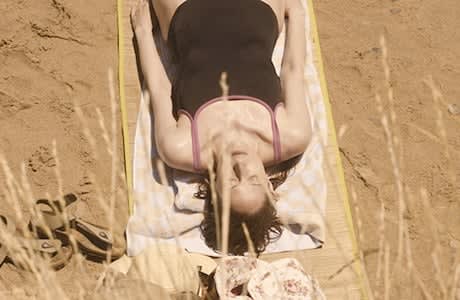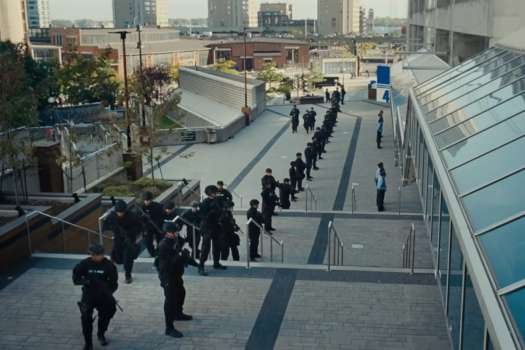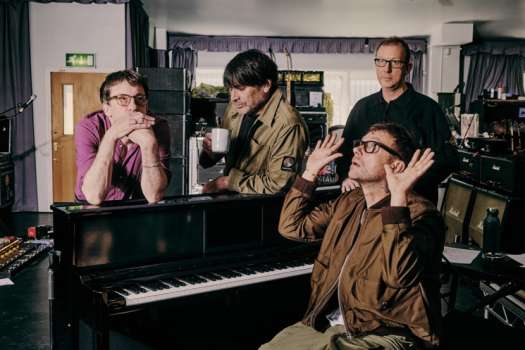After 11-years away from feature-length filmmaking, Penny Panayotopoulou returns to the idea of loss as instigator of change with September, detailing the challenges of confronting a new reality defined by the inescapable void that death leaves. The avoidance of this reality was very much the impetus behind Hard Goodbyes: My Father, a film that engaged with the delusions of a young boy making up an idealised relationship dialogue with his recently deceased father, while displaced affections and interpreting the self in the absence of a static, emotionally sustaining relationship is the trajectory for September
Anna (Kora Karvouni), a woman of her early thirties, lives an exceptionally unexceptional simple life, working at an IKEA during the day before returning to her humble apartment where she lives with her collie. Her relationship with her dog ultimately defines her. Though her background is given little context, there's an obvious hurt and learned disappointment that stems from eschewing traditional human relationships in favour of a more loyal and consistent friendship with a pet.
This is why the early death of her dog triggers such a dramatic crisis, leading her to reach out to her only neighbour—Sophia (Maria Skoula)—with an unpaved back yard for somewhere to bury him. That Sophia extended a kindness to Anna, one that indirectly welcomed her into her home and within proximity of her family (a husband and two children), becomes the focus for this grieving and exceedingly lonely woman, giving meaning and daily purpose to an otherwise empty and ordinary life.
Though September (a metaphoric month representing transition and staring anew) presents as a psychological thriller of sorts, detailing the increasingly discomforting fixation Anna has on this mostly happy family, Panayotopoulou is far more interested in interpreting the evolution of her characters than constructing a social admonitory.
Still, as the plot progresses and Anna's tendency to peep in her neighbour's windows and steal their garbage escalates into a constant, compounding litany of untruths—a fake birthday party, being locked out of her apartment, a broken down car—just to gain access to their home, there's an impending sense of dread. Panayotopoulou is careful to subdue this unnerving sensibility by establishing some depth to the relationship between Sophia and Anna, suggesting that though Sophia knows this socially inept woman is demonstrating the behaviour of a stalker, she understands where she's coming from and wants to aid in her loneliness.
There's no clear suggestion that the traditional nuclear family is being specifically threatened by the inclusion of someone that evades standard heteronormative performance, but this concept—one that defined Western cinema in the '80s and '90s and continues to flood Asian cinema—still lingers in a reactionary, conservative sense. Fortunately, no set vilification or heightened melodrama occurs, leaving September to play as the examination of a problem, presenting the discrepancies and similarities between two women that have chosen very different paths to protect the self from either emotional or economic heartache.
And since this is ostensibly a character piece, Panayotopoulou is careful to frame the story formally, subduing stylization without allowing things to become too loose or free from the narrative security of deliberate composition. Much like the story itself, the aesthetic is deliberate and telling without forcing a sense of morality or genre specificity onto the audience, leaving the somewhat ambivalent ending open to interpretation and individual ideology.
(Twenty Twenty Vision)Anna (Kora Karvouni), a woman of her early thirties, lives an exceptionally unexceptional simple life, working at an IKEA during the day before returning to her humble apartment where she lives with her collie. Her relationship with her dog ultimately defines her. Though her background is given little context, there's an obvious hurt and learned disappointment that stems from eschewing traditional human relationships in favour of a more loyal and consistent friendship with a pet.
This is why the early death of her dog triggers such a dramatic crisis, leading her to reach out to her only neighbour—Sophia (Maria Skoula)—with an unpaved back yard for somewhere to bury him. That Sophia extended a kindness to Anna, one that indirectly welcomed her into her home and within proximity of her family (a husband and two children), becomes the focus for this grieving and exceedingly lonely woman, giving meaning and daily purpose to an otherwise empty and ordinary life.
Though September (a metaphoric month representing transition and staring anew) presents as a psychological thriller of sorts, detailing the increasingly discomforting fixation Anna has on this mostly happy family, Panayotopoulou is far more interested in interpreting the evolution of her characters than constructing a social admonitory.
Still, as the plot progresses and Anna's tendency to peep in her neighbour's windows and steal their garbage escalates into a constant, compounding litany of untruths—a fake birthday party, being locked out of her apartment, a broken down car—just to gain access to their home, there's an impending sense of dread. Panayotopoulou is careful to subdue this unnerving sensibility by establishing some depth to the relationship between Sophia and Anna, suggesting that though Sophia knows this socially inept woman is demonstrating the behaviour of a stalker, she understands where she's coming from and wants to aid in her loneliness.
There's no clear suggestion that the traditional nuclear family is being specifically threatened by the inclusion of someone that evades standard heteronormative performance, but this concept—one that defined Western cinema in the '80s and '90s and continues to flood Asian cinema—still lingers in a reactionary, conservative sense. Fortunately, no set vilification or heightened melodrama occurs, leaving September to play as the examination of a problem, presenting the discrepancies and similarities between two women that have chosen very different paths to protect the self from either emotional or economic heartache.
And since this is ostensibly a character piece, Panayotopoulou is careful to frame the story formally, subduing stylization without allowing things to become too loose or free from the narrative security of deliberate composition. Much like the story itself, the aesthetic is deliberate and telling without forcing a sense of morality or genre specificity onto the audience, leaving the somewhat ambivalent ending open to interpretation and individual ideology.




